|
|
|
Sort Order |
|
|
|
Items / Page
|
|
|
|
|
|
|
| Srl | Item |
| 1 |
ID:
167180
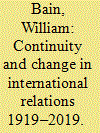

|
|
|
|
|
| Summary/Abstract |
This article reflects on themes of continuity and change over the past century of international relations. In 1919 the victors of the First World War endeavoured to remake international relations by abolishing war and erecting institutional structures that were intended to promote a more just world order. The achievements and failures of this project can be discerned in overlapping patterns of continuity and change that portray a world that is at once old and new. The discourse of change tends to dominate thinking about international relations. Technological innovation, globalisation, and human rights, among other factors, cultivate the progressive ‘one-worldism’ of an interconnected global community of nations and peoples. But, evidence of change notwithstanding, much of contemporary international relations would be intelligible to persons who lived a century ago. International relations is still fundamentally about order and security, power and restraint, and freedom and equality. These patterns provide an important reminder that progress is possible but that international relations involves an open-ended project of continuous renovation and conservation.
|
|
|
|
|
|
|
|
|
|
|
|
|
|
|
|
| 2 |
ID:
167190
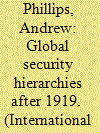

|
|
|
|
|
| Summary/Abstract |
Since 1919, world leaders have sought to uphold and advance international order by sponsoring a succession of global security hierarchies, understood as authoritative arrangements that are global in scope and dedicated to mitigating international security challenges. These hierarchies have progressively broadened in the inclusivity of their security referents. Explicitly racist and civilizational answers to the question ‘security for whom’ have given way to more cosmopolitan visions of security hierarchy. The scope of the challenges these hierarchies have aimed to mitigate (‘security from what’) has also broadened, alongside the intrusiveness of the measures (‘security through which means’) licenced to manage them. The progression towards more inclusive, ambitious and intrusive global security hierarchies has nevertheless evolved in tension with the parallel globalization of both nationalism and the sovereign state system. These countervailing influences – in conjunction with the recent worldwide resurgence of illiberal forces – now threaten the prospective longevity of today’s United Nation (UN)-centric cosmopolitan global security hierarchy.
|
|
|
|
|
|
|
|
|
|
|
|
|
|
|
|
| 3 |
ID:
167208
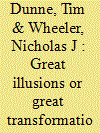

|
|
|
|
|
| Summary/Abstract |
Human rights have been in the practice of international relations, but they have not been central to academic thinking on International Relations (IR) for most of the century since the discipline became institutionalized in 1919. We suggest two related reasons for this relative neglect by the IR community. First, the US heartland of IR prioritized other institutions of international order during the 1950s and 1960s, primarily the balance of power, diplomacy, and arms control. Second, human rights were treated with suspicion by realists in particular given their view that morality in foreign policy was potentially disruptive of international order. If the emergent discipline of IR largely ignored the 1948 Universal Declaration of Human Rights, so did the rest of the world according to the revisionist history of human rights offered by Samuel Moyn. He challenges the idea that the birth of the regime was the culmination of a 150-year struggle that began in the minds of Enlightenment thinkers and ended with a new globalized framework of rights for all. While IR was slow to come to human rights, the pace in the last three decades has quickened considerably; the area of protecting the basic right of security from violence being a case in point, where several IR scholars have been pivotal in the development of action-guiding theory. Developing a critical theme in Carr’s The Twenty Years’ Crisis 1919-1939, we consider whether these institutional developments represent great illusions or great transformations in international relations in Carr’s terms.
|
|
|
|
|
|
|
|
|
|
|
|
|
|
|
|
| 4 |
ID:
167187
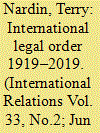

|
|
|
|
|
| Summary/Abstract |
Despite repeated claims during the past century that the international legal order has been radically transformed, the contours of that order are in many ways the same in 2019 as they were in 1919. New laws govern international institutions, human rights, trade, and the environment and new institutions have emerged that affect how international law is interpreted and applied. War has lost legitimacy as a tool of foreign policy and individual responsibility for aggression and crimes against humanity has been affirmed. Yet these changes build on ideas and practices that may have been rudimentary but were not absent a century ago. Underlying them are persistent differences involving a shifting cast of old and new states as well as differences between local and universal ideals and between instrumental and noninstrumental conceptions of law. The traditional understanding of state sovereignty on which the international legal order rests has been qualified but not discarded, and its persistence confirms that the system it orders remains a system of states.
|
|
|
|
|
|
|
|
|
|
|
|
|
|
|
|
| 5 |
ID:
167197


|
|
|
|
|
| Summary/Abstract |
Drawing on recent scholarship on race, post-colonialism, and ethics in the field of international relations, I return to the ‘first debate’ in the field regarding realism versus liberalism to highlight how racialized international political practices a century ago shaped theoretical assumptions, deferrals, and absences in ways that continued to resonate throughout the century. In reviewing several prominent periods of the past 100 years, I argue that (a) a powerful, ongoing moral aporia regarding race has marked the practice of international politics and the study of international relations over the century, despite important challenges and (b) it is critically important for the field as a whole to confront both the aporia and these challenges to understand its own moral precarity and to dent ongoing racialized injustices.
|
|
|
|
|
|
|
|
|
|
|
|
|
|
|
|
| 6 |
ID:
167196


|
|
|
|
|
| Summary/Abstract |
One hundred years ago, the first Department of International Politics was established at the University College of Wales, Aberystwyth, with the express purpose of seeking in Arnold Toynbee’s prophetic words (uttered many years later) – of breaking decisively with the ‘habit of nationalism’. As David Davies in the founding statement put it, by moving beyond ‘insular and vested prejudices … the shattered family of nations’ could be brought back together again and a new world order established. Yet as the history of the twentieth century showed – and the new century looks to be no nearer to realizing that original dream – nationalism has throughout continued to retain its power of mobilizing peoples and setting nation against nation. How and why this happened and with what consequences is the subject of this article.
|
|
|
|
|
|
|
|
|
|
|
|
|
|
|
|
| 7 |
ID:
167184
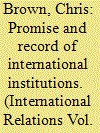

|
|
|
|
|
| Summary/Abstract |
In 1919 the attempt was made to reset the institutions governing international relations, with new patterns of expected behaviour and new international organisations. The key organisation, the League of Nations, effectively remains in place, albeit rebranded as the United Nations, but in 2019 great power relations have reverted to pre-1914 modes of conduct; attempts to extend the range of international institutions after the end of the Cold War have failed at the level of the central system. Outside of this central system, an extensive human rights regime, new notions of sovereignty and the development of international criminal law have produced a new set of institutions and expectations, an embryonic ‘global polity’ based on post-1945 European political experience and extending to democracies in Latin America and Africa. The rise of populism is placing strains on this global polity and the relations between this mode of doing international relations and that of the three major powers is also a source of tension – the fate of the liberal internationalist ideas set in train in 1919 remains in the balance.
|
|
|
|
|
|
|
|
|
|
|
|
|
|
|
|
| 8 |
ID:
167203
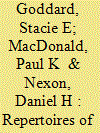

|
|
|
|
|
| Summary/Abstract |
Issues involving ‘statecraft’ lie at the heart of most major debates about world politics, yet scholars do not go far enough in analyzing how the processes of statecraft themselves can reshape the international system. We draw on the growing relational-processual literature in international relations theory to explore how different modes of statecraft can help create and refashion the structure of world politics. In particular, we argue that scholars should reconceive statecraft in terms of repertoires. An emphasis on repertoires sheds light on a number of issues, including how statecraft influences patterns of technological innovation, the construction of institutional and normative orders, and the pathways through which states mobilize power in world politics.
|
|
|
|
|
|
|
|
|
|
|
|
|
|
|
|
| 9 |
ID:
167193
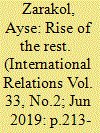

|
|
|
|
|
| Summary/Abstract |
The past decade has been characterised (among other things) by the emergence of a discourse about the ‘Rise of the Rest’. (Some) non-Western states have been described as ‘rising powers’ capable of agency in the international system and as potential partners for the West in global governance. This stands in contrast to a more traditional narrative that saw the non-West primarily as a source of international problems and a developmental project. Does this discursive shift signify a historic reversal in how the non-West understood by the West? The answer is complicated. In this article, I argue that the hype about ‘rising powers’ in Western policy circles following the Global Financial Crisis of 2007–2008 had little relation to an ‘objective’ analysis of actual structural shifts in favour of ‘the Rest’ and was more akin to a financial bubble, with speculation driving perceptions of ‘rising powers’. I also show that the ‘rising powers’ literature is better located within the broader (and long-standing) debate about the decline of the United States, and should be read more as a manifestation of American anxieties and hopes than as informing us about the choices or the motivations of the ‘rising powers’. Ironically, however, the Western hype nevertheless has helped along a structural shift that is under way, first by partly moulding reality in that direction (especially in the form of financial decisions), but more importantly by freeing non-Western powers (for better or worse) from their internalised cages of perceived inferiority and lack of agency in the modern international order.
|
|
|
|
|
|
|
|
|
|
|
|
|
|
|
|
| 10 |
ID:
167207


|
|
|
|
|
| Summary/Abstract |
Despite repeated announcements of the end of ideology and the demise of religion during the twentieth century, both play a crucial role in world politics today. This disjuncture between theoretical expectations and historical developments has its roots in conventional conceptions of ideology. While the latter grasp the representative nature of ideology as an expression of historical forces and political interests, they miss its constitutive role for modern politics. Based on an analysis of its historical origins and political implications, this article develops a new conception of ideology which accounts for the resilience and historical dynamics of ideological struggle. Like the sorcerer’s apprentice, I show, liberalism has called ideology into being but lost control of its own creation.
|
|
|
|
|
|
|
|
|
|
|
|
|
|
|
|
| 11 |
ID:
167195
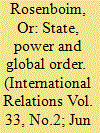

|
|
|
|
|
| Summary/Abstract |
This article examines the evolution of international thought through the notion of ‘political space’. It focuses on two important domains of international politics, the nation-state and the global, to reflect on spatial categories in the discipline of International Relations (IR). Since its inception, the concept of the nation-state has dominated mainstream IR theory. Yet an investigation of how international order has been theorized over IR’s first century shows that this era has also been defined by globalist visions of political order. Nowadays, globalization is sometimes seen as the apex of the historical interplay of particularity and universality. The progression towards global political and economic order, however, is today undermined by the resurgence of state-centric political nationalism which seeks to challenge the legitimacy of the global political space. By examining how past international thinkers including Alfred Zimmern, Barbara Ward, Hans Morgenthau, E. H. Carr and John Herz, imagined and interpreted the relations of space and politics in the national and global spheres, this article suggests that spatial thinking offers an insightful approach for theorizing international relations. The article argues that the global and national spaces attain their political meanings through divisions as well as interactions and connections. The focus on divisions, exemplified in the writings of Barbara Ward, helps to make sense of the modus operandi of power in the national and global political spaces by investigating differences, tensions and instability.
|
|
|
|
|
|
|
|
|
|
|
|
|
|
|
|
| 12 |
ID:
167189
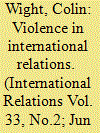

|
|
|
|
|
| Summary/Abstract |
This article examines change and continuity in the function, role and moral judgement of violence in international relations. In terms of change, the conclusions are mostly pessimistic if the aim is the complete eradication of political violence. The control of violence, on the other hand, and the ability to hold those who employ it to increasing moral and legal standards is perhaps one of the most significant changes in international relations from 1919 to 2019. However, this does not mean that violence has been replaced or even transformed. Violence is constitutive of the political. It is the first and the last word in politics. This is the continuity of violence. Violence, of which war is only the most visceral expression, has not been transformed or replaced, but rather it has been displaced into legal systems, institutional orders and new forms of conflict. Inter-state war may be in decline, but intra-state conflict is rising. To develop this argument, the article argues that change can only be understood as change against a horizon of continuity.
|
|
|
|
|
|
|
|
|
|
|
|
|
|
|
|
|
|
|
|
|